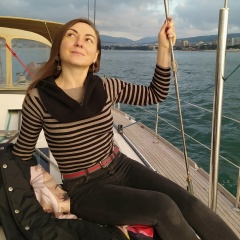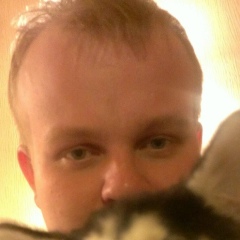Наверно многие после этого не станут читать, но сегодня обойдусь без юмора, хотя и буду обсуждать произведение из школьной программы за 5й класс (странный выбор министерства, ну что уж). По моему субъективному мнению это лучший рассказ за историю человечества, некий эталон. А говорю я про «Муму» И.С.Тургенева. Кто не читал быстро это сделали, а то щас я вас по уши натыкаю спойлерами, хотя кто ж не в курсе, что там была утоплена собака. Мы же сегодня попробуем разобраться зачем это было сделано.
Главный герой рассказа глухонемой мужик Герасим, здоровый, как гора. Самым хорошим описанием его могучести является «а на ночь в конюшне он так усердно чистил и тер свою лошадь, что та шаталась, как былинка на ветру, и переваливалась с ноги на ногу под его железными кулаками». Он очень любил порядок, был строгим и серьёзным. По прочтении рассказа и псу становится понятно что Герасим является олицетворением Руси - здоровенной и могучей, но немой. Его хозяйка олицетворяет власть, а всевозможные дворецкие и тд чиновников разных рангов. И вот эта власть считает, что она может распоряжаться судьбами своих дворовых и сперва отбирает первое что было дорого Герасиму - прачку Татьяну, женив её на алкаше (при том «Герасим терпеть не мог пьяниц»). Идиотизм власти хорошо показан тем, что она думает если люди перед ней лебезят, то и каждая собака, находящаяся на её территории, должна беспрекословно повиноваться её слову (это про момент, когда Муму оскалила зубы на хозяйку).
Вся эта игра с персонажами и их смыслами очень шикарный ход и по мне так тоньше уже не выдумать, но перейдём непосредственно к четвероногим. Очень круто что Тургенев сделал так, что Герасим спасает маленького щенка - будущую Муму из воды и туда же отправляет её, привязав к шее два кирпича, в конце рассказа. Этим он наверно хотел показать, что наш глухонемой герой по факту ничего плохого не совершил, а даже подарил этому существу некоторое время жизни, тем самым, заранее оббеляя образ Герасима.По моей теории Муму является олицетворением новых западных свобод (она была испанской породы), которая должна помочь окончательно не согнуться русскому человеку под гнётом власти (на дворе есть другой старый пёс Волчок, которого даже ночью не спускали с цепи). Ну а дальше всё как всегда - Муму оскалила зубы на хозяйку, та обиделась «Кто позволил ему собаку у меня на дворе держать», приказание избавиться от собаки, две тяжёлые слезы,выкатившиеся из глаз Герасима, а далее самая крутая сцена, точнее самое неебическое описание этой сцены и самый забубенный абзац (по версии меня) за всю историю человечества, чётче и трогательней написать, я думаю, уже невозможно:
"А Герасим всё греб да греб. Вот уже Москва осталась назади. Вот уже потянулись по берегам луга, огороды, поля, рощи, показались избы. Повеяло деревней. Он бросил весла, приник головой к Муму, которая сидела перед ним на сухой перекладинке — дно было залито водой — и остался неподвижным, скрестив могучие руки у ней на спине, между тем как лодку волной помаленьку относило назад к городу. Наконец Герасим выпрямился, поспешно, с каким-то болезненным озлоблением на лице, окутал веревкой взятые им кирпичи, приделал петлю, надел ее на шею Муму, поднял ее над рекой, в последний раз посмотрел на нее... Она доверчиво и без страха поглядывала на него и слегка махала хвостиком. Он отвернулся, зажмурился и разжал руки... Герасим ничего не слыхал, ни быстрого визга падающей Муму, ни тяжкого всплеска воды; для него самый шумный день был безмолвен и беззвучен, как ни одна самая тихая ночь не беззвучна для нас, и когда он снова раскрыл глаза, по-прежнему спешили по реке, как бы гоняясь друг за дружкой, маленькие волны, по-прежнему поплескивали они о бока лодки, и только далеко назади к берегу разбегались какие-то широкие круги."
Нереально мегакруто то, что он глух и при этом мало того что зажмурился, так ещё и отвернулся. Про "для него самый шумный день был безмолвен и беззвучен» так это совсем пушка пушечная! И по факту вся трагедия для Герасима состоялась в этом "разбегались какие-то широкие круги». Сколько же силы именно в этом по сути выражающем безразличие слове КАКИЕ-ТО. Я бы выдал Тургеневу Оскара, если бы он у меня был, только за эти несколько строчек.
Моя теория о том что Муму олицетворяет именно западные свободы, а не свободу вообще как считают другие, выглядит более состоятельной и даёт более или менее здравый ответ на вопрос «Зачем Герасим утопил свою Муму?», ведь далее он собрал все свои пожитки и рванул прямиком в свою деревню "Он торопился, как будто мать-старушка ждала его на родине, как будто она звала его к себе после долгого странствования на чужой стороне, в чужих людях…». избавившись от всего этого городского, что само по себе уже западное, он пошёл туда, где русскому человеку всегда хорошо - в деревню, в глушь. Этот рассказ основан на реальных событиях, но в жизни тот самый Немой остался на службе у хозяйки после того как утопил свою собаку, что может быть даже ещё грустней...
А закончу я концовкой «Муму»: Но соседи заметили, что со времени своего возвращения из Москвы он совсем перестал водиться с женщинами, даже не глядит на них, и ни одной собаки у себя не держит. «Впрочем, — толкуют мужики, — его же счастье, что ему не надобеть бабья; а собака — на что ему собака? к нему на двор вора о́селом не затащить!» Такова ходит молва о богатырской силе немого.
Главный герой рассказа глухонемой мужик Герасим, здоровый, как гора. Самым хорошим описанием его могучести является «а на ночь в конюшне он так усердно чистил и тер свою лошадь, что та шаталась, как былинка на ветру, и переваливалась с ноги на ногу под его железными кулаками». Он очень любил порядок, был строгим и серьёзным. По прочтении рассказа и псу становится понятно что Герасим является олицетворением Руси - здоровенной и могучей, но немой. Его хозяйка олицетворяет власть, а всевозможные дворецкие и тд чиновников разных рангов. И вот эта власть считает, что она может распоряжаться судьбами своих дворовых и сперва отбирает первое что было дорого Герасиму - прачку Татьяну, женив её на алкаше (при том «Герасим терпеть не мог пьяниц»). Идиотизм власти хорошо показан тем, что она думает если люди перед ней лебезят, то и каждая собака, находящаяся на её территории, должна беспрекословно повиноваться её слову (это про момент, когда Муму оскалила зубы на хозяйку).
Вся эта игра с персонажами и их смыслами очень шикарный ход и по мне так тоньше уже не выдумать, но перейдём непосредственно к четвероногим. Очень круто что Тургенев сделал так, что Герасим спасает маленького щенка - будущую Муму из воды и туда же отправляет её, привязав к шее два кирпича, в конце рассказа. Этим он наверно хотел показать, что наш глухонемой герой по факту ничего плохого не совершил, а даже подарил этому существу некоторое время жизни, тем самым, заранее оббеляя образ Герасима.По моей теории Муму является олицетворением новых западных свобод (она была испанской породы), которая должна помочь окончательно не согнуться русскому человеку под гнётом власти (на дворе есть другой старый пёс Волчок, которого даже ночью не спускали с цепи). Ну а дальше всё как всегда - Муму оскалила зубы на хозяйку, та обиделась «Кто позволил ему собаку у меня на дворе держать», приказание избавиться от собаки, две тяжёлые слезы,выкатившиеся из глаз Герасима, а далее самая крутая сцена, точнее самое неебическое описание этой сцены и самый забубенный абзац (по версии меня) за всю историю человечества, чётче и трогательней написать, я думаю, уже невозможно:
"А Герасим всё греб да греб. Вот уже Москва осталась назади. Вот уже потянулись по берегам луга, огороды, поля, рощи, показались избы. Повеяло деревней. Он бросил весла, приник головой к Муму, которая сидела перед ним на сухой перекладинке — дно было залито водой — и остался неподвижным, скрестив могучие руки у ней на спине, между тем как лодку волной помаленьку относило назад к городу. Наконец Герасим выпрямился, поспешно, с каким-то болезненным озлоблением на лице, окутал веревкой взятые им кирпичи, приделал петлю, надел ее на шею Муму, поднял ее над рекой, в последний раз посмотрел на нее... Она доверчиво и без страха поглядывала на него и слегка махала хвостиком. Он отвернулся, зажмурился и разжал руки... Герасим ничего не слыхал, ни быстрого визга падающей Муму, ни тяжкого всплеска воды; для него самый шумный день был безмолвен и беззвучен, как ни одна самая тихая ночь не беззвучна для нас, и когда он снова раскрыл глаза, по-прежнему спешили по реке, как бы гоняясь друг за дружкой, маленькие волны, по-прежнему поплескивали они о бока лодки, и только далеко назади к берегу разбегались какие-то широкие круги."
Нереально мегакруто то, что он глух и при этом мало того что зажмурился, так ещё и отвернулся. Про "для него самый шумный день был безмолвен и беззвучен» так это совсем пушка пушечная! И по факту вся трагедия для Герасима состоялась в этом "разбегались какие-то широкие круги». Сколько же силы именно в этом по сути выражающем безразличие слове КАКИЕ-ТО. Я бы выдал Тургеневу Оскара, если бы он у меня был, только за эти несколько строчек.
Моя теория о том что Муму олицетворяет именно западные свободы, а не свободу вообще как считают другие, выглядит более состоятельной и даёт более или менее здравый ответ на вопрос «Зачем Герасим утопил свою Муму?», ведь далее он собрал все свои пожитки и рванул прямиком в свою деревню "Он торопился, как будто мать-старушка ждала его на родине, как будто она звала его к себе после долгого странствования на чужой стороне, в чужих людях…». избавившись от всего этого городского, что само по себе уже западное, он пошёл туда, где русскому человеку всегда хорошо - в деревню, в глушь. Этот рассказ основан на реальных событиях, но в жизни тот самый Немой остался на службе у хозяйки после того как утопил свою собаку, что может быть даже ещё грустней...
А закончу я концовкой «Муму»: Но соседи заметили, что со времени своего возвращения из Москвы он совсем перестал водиться с женщинами, даже не глядит на них, и ни одной собаки у себя не держит. «Впрочем, — толкуют мужики, — его же счастье, что ему не надобеть бабья; а собака — на что ему собака? к нему на двор вора о́селом не затащить!» Такова ходит молва о богатырской силе немого.
Likely many will not read after that, but today I will manage without humor, although I will discuss a work from the school curriculum for the 5th grade (a strange choice of the ministry, well, really). In my subjective opinion, this is the best story in the history of mankind, a certain standard. And I'm talking about the "Mum" by I. S. Turgenev. Whoever didn’t read quickly did it, otherwise right now I’ll bump you into the ears with spoilers, although who don’t know that the dog was drowned there. Today we’ll try to figure out why this was done.
The protagonist of the story is a deaf-mute man Gerasim, healthy as a mountain. The best description of his power is “and at night in the stable he cleaned and rubbed his horse so hard that it staggered like a blade of grass in the wind and rolled over from one foot to another under his iron fists.” He loved order very much, was strict and serious. After reading the story and the dog, it becomes clear that Gerasim is the personification of Russia - hefty and powerful, but dumb. His mistress personifies power, and all kinds of butlers and so on officials of different ranks. And now this government believes that it can control the fate of its courtyards and first takes away the first thing that was expensive for Gerasim - the washerwoman Tatyana, marrying her to an alcoholic (while “Gerasim could not stand drunkards”). The idiocy of the authorities is well shown by the fact that she thinks that if people are lying in front of her, then every dog located on its territory must obey her word unquestioningly (this is about the moment when Mumu bared her teeth at the mistress).
This whole game with characters and their meanings is a very chic move, and for me it’s not possible to invent anything more subtle, but we will go directly to the four-legged ones. It is very cool that Turgenev made Gerasim save a little puppy - the future Mumu from the water and sends her there, tying two bricks to his neck at the end of the story. By this, he probably wanted to show that our deaf-mute hero did nothing wrong in fact, and even gave this creature some life, thereby whitening the image of Gerasim in advance. According to my theory, Mumu is the personification of new Western freedoms (she was a Spanish breed), which should help not to bend completely to the Russian man under the yoke of power (in the yard there is another old Volchok dog, which they didn’t let go of the chain even at night). Well, then everything is as always - Mumu bared her teeth at the mistress, she was offended by “Who allowed him to keep the dog in my yard”, an order to get rid of the dog, two heavy tears that rolled out of Gerasim’s eyes, and then the coolest scene, or rather the most non-heavenly the description of this scene and the most rugged paragraph (according to me) in the entire history of mankind, it is already impossible to write more clearly and touchingly:
“And Gerasim was rowing and rowing. Moscow has already left and back. Meadows, gardens, fields, groves have already stretched along the shores, huts have appeared. It has bequeathed by the village. He threw the oars, laid his head on Mumu, who was sitting in front of him on a dry crossbar - the bottom was flooded with water - and remained motionless, crossing her mighty hands on her back, while the boat gradually waved the boat back to the city. the noose, put it on Mumu’s neck, raised it e over the river, looked at her for the last time ... She looked at him trustingly and without fear and waved her tail slightly.He turned away, closed his eyes and unclenched his hands ... Gerasim heard nothing, neither a quick screech of the falling Mumu, nor a heavy splash water; for him, the noisiest day was silent and soundless, like no quietest night is soundless for us, and when he opened his eyes again, they still hurried along the river, as if chasing each other, small waves, as before they splashed on the sides of the boat, and only far back to the shore scattered s a wide circles. "
It is unrealistic that it is deaf and deaf, and at the same time it’s not only closed its eyes, it also turned away. About "for him the noisiest day was silent and soundless" so it’s just a cannon cannon! And in fact the whole tragedy for Gerasim took place in this "some wide circles scattered." How much power is precisely in this essentially indifferent word SOMETHING. I would give Oscar to Turgenev, if I had, only for these few lines.
My theory that it is Western freedoms that represents Mumu, and not freedom in general, as others believe, looks more wealthy and gives a more or less robust answer to the question “Why did Gerasim drown his Mumu?”, Because then he collected all his belongings and rushed straight to his village "He was in a hurry, as if an old mother was waiting for him at home, as if she was calling him to her after a long wandering on a stranger’s side, in strangers ..." getting rid of all this city, which in itself is western, he went to where the Russian man is sun GDS well -. in the village, in the wilderness, this story is based on real events, but in the life of the dumbest remained in the service of the hostess after drowning his dog, which can even be more sad ...
And I’ll end with the ending of “Mumu”: But with
The protagonist of the story is a deaf-mute man Gerasim, healthy as a mountain. The best description of his power is “and at night in the stable he cleaned and rubbed his horse so hard that it staggered like a blade of grass in the wind and rolled over from one foot to another under his iron fists.” He loved order very much, was strict and serious. After reading the story and the dog, it becomes clear that Gerasim is the personification of Russia - hefty and powerful, but dumb. His mistress personifies power, and all kinds of butlers and so on officials of different ranks. And now this government believes that it can control the fate of its courtyards and first takes away the first thing that was expensive for Gerasim - the washerwoman Tatyana, marrying her to an alcoholic (while “Gerasim could not stand drunkards”). The idiocy of the authorities is well shown by the fact that she thinks that if people are lying in front of her, then every dog located on its territory must obey her word unquestioningly (this is about the moment when Mumu bared her teeth at the mistress).
This whole game with characters and their meanings is a very chic move, and for me it’s not possible to invent anything more subtle, but we will go directly to the four-legged ones. It is very cool that Turgenev made Gerasim save a little puppy - the future Mumu from the water and sends her there, tying two bricks to his neck at the end of the story. By this, he probably wanted to show that our deaf-mute hero did nothing wrong in fact, and even gave this creature some life, thereby whitening the image of Gerasim in advance. According to my theory, Mumu is the personification of new Western freedoms (she was a Spanish breed), which should help not to bend completely to the Russian man under the yoke of power (in the yard there is another old Volchok dog, which they didn’t let go of the chain even at night). Well, then everything is as always - Mumu bared her teeth at the mistress, she was offended by “Who allowed him to keep the dog in my yard”, an order to get rid of the dog, two heavy tears that rolled out of Gerasim’s eyes, and then the coolest scene, or rather the most non-heavenly the description of this scene and the most rugged paragraph (according to me) in the entire history of mankind, it is already impossible to write more clearly and touchingly:
“And Gerasim was rowing and rowing. Moscow has already left and back. Meadows, gardens, fields, groves have already stretched along the shores, huts have appeared. It has bequeathed by the village. He threw the oars, laid his head on Mumu, who was sitting in front of him on a dry crossbar - the bottom was flooded with water - and remained motionless, crossing her mighty hands on her back, while the boat gradually waved the boat back to the city. the noose, put it on Mumu’s neck, raised it e over the river, looked at her for the last time ... She looked at him trustingly and without fear and waved her tail slightly.He turned away, closed his eyes and unclenched his hands ... Gerasim heard nothing, neither a quick screech of the falling Mumu, nor a heavy splash water; for him, the noisiest day was silent and soundless, like no quietest night is soundless for us, and when he opened his eyes again, they still hurried along the river, as if chasing each other, small waves, as before they splashed on the sides of the boat, and only far back to the shore scattered s a wide circles. "
It is unrealistic that it is deaf and deaf, and at the same time it’s not only closed its eyes, it also turned away. About "for him the noisiest day was silent and soundless" so it’s just a cannon cannon! And in fact the whole tragedy for Gerasim took place in this "some wide circles scattered." How much power is precisely in this essentially indifferent word SOMETHING. I would give Oscar to Turgenev, if I had, only for these few lines.
My theory that it is Western freedoms that represents Mumu, and not freedom in general, as others believe, looks more wealthy and gives a more or less robust answer to the question “Why did Gerasim drown his Mumu?”, Because then he collected all his belongings and rushed straight to his village "He was in a hurry, as if an old mother was waiting for him at home, as if she was calling him to her after a long wandering on a stranger’s side, in strangers ..." getting rid of all this city, which in itself is western, he went to where the Russian man is sun GDS well -. in the village, in the wilderness, this story is based on real events, but in the life of the dumbest remained in the service of the hostess after drowning his dog, which can even be more sad ...
And I’ll end with the ending of “Mumu”: But with

У записи 121 лайков,
5 репостов,
10979 просмотров.
5 репостов,
10979 просмотров.
Эту запись оставил(а) на своей стене Миша Бо





































































